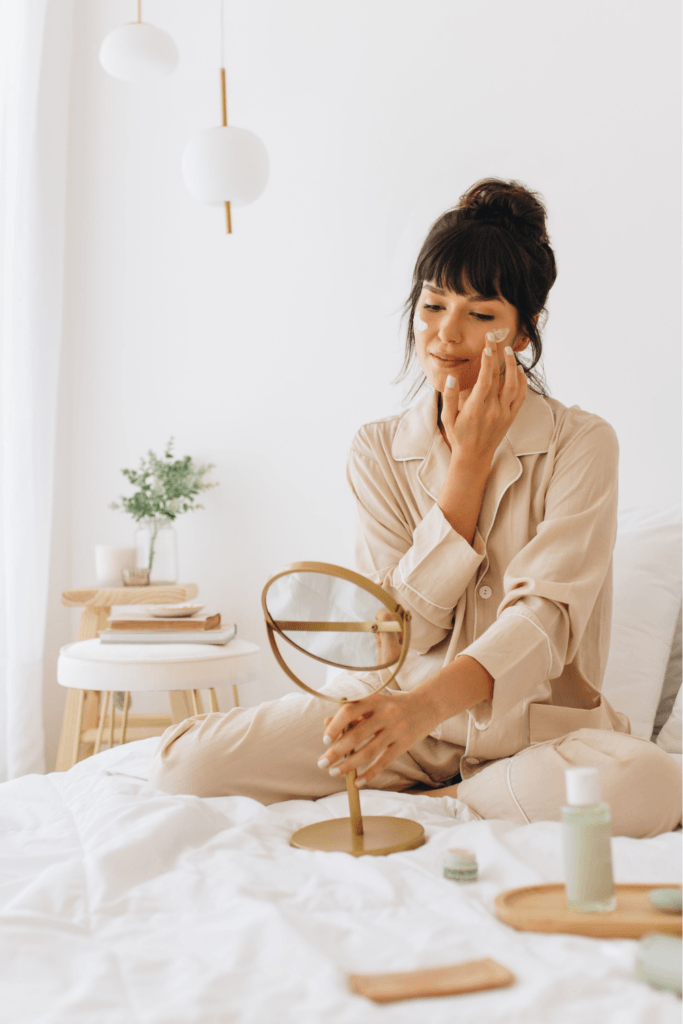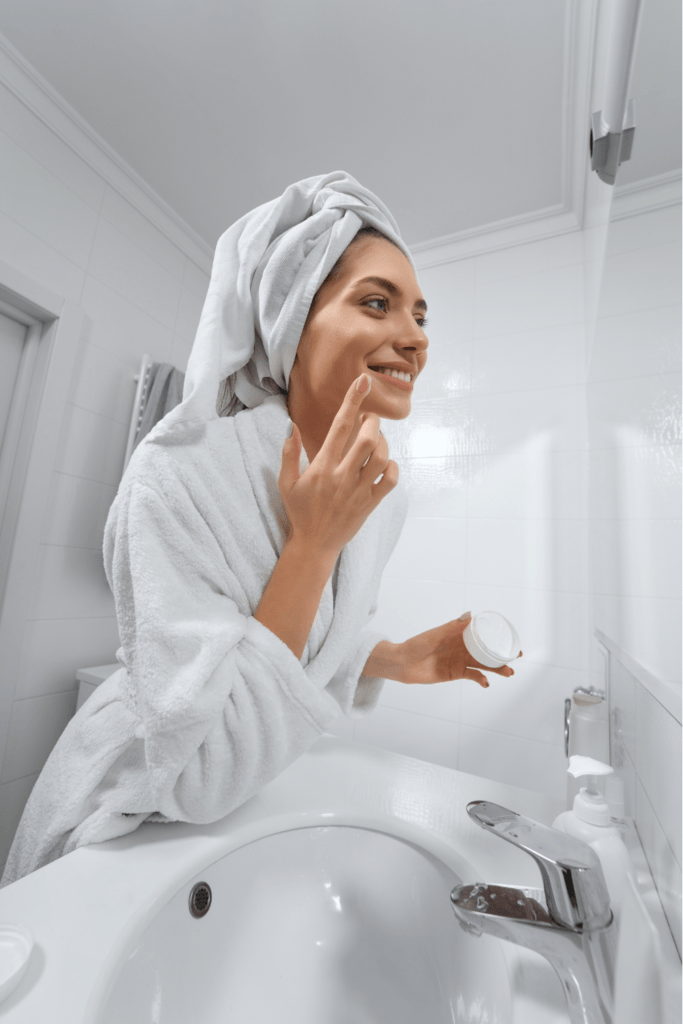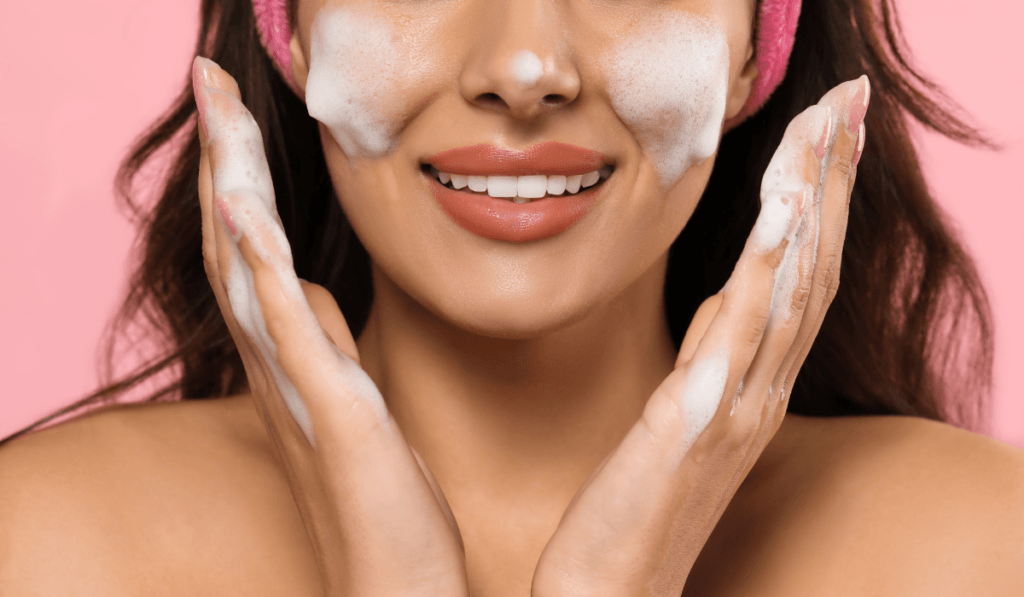This post contains Amazon affiliate links.
Disclaimer: While this post aims to provide informative insights, it’s important to note that I am not a doctor, dermatologist, or medical esthetician. For personalized skincare advice, it’s always best to consult a licensed medical professional, ensuring you make informed decisions about your skincare routine.
I’m going to introduce you to a skincare trend that’s been catching the attention of beauty enthusiasts and skincare experts: sleeping masks.
Have you seen these overnight masks hit the shelves of big beauty brands and wondered what is a sleeping mask for? Let’s dive in!
What Is a Sleeping Mask For?
Also called sleep masks, overnight masks, or sleeping packs—These aren’t your typical facial masks that you rinse off after 15 minutes. Instead, sleeping masks are designed to be a potent part of your nighttime routine, working their magic while you catch some Zs.
While sleeping masks and moisturizers may share shelf space in your bathroom, they each play a unique role in skin health. What’s noteworthy about sleep masks is their focus on intensive hydration and nourishment throughout the night.
Ever wonder why people talk about ‘beauty sleep’? It’s because while you’re dreaming, your skin is hard at work. During sleep, your skin’s blood flow increases. That helps your skin rebuild its collagen and repair damage from UV exposure, reducing wrinkles and age spots. This is where a sleeping mask enters the picture, boosting this natural renewal process with hydration and active ingredients.
And it’s not just for those with dry skin or who are looking for anti-aging benefits. Sleep masks are versatile—some target specific concerns like hyperpigmentation or texture improvements. There are many options tailored to various skin concerns, ensuring that everyone can find their perfect nighttime treatment.

Now, what is the difference between a sleeping mask and moisturizer? Don’t they kind of sound the same?
Sleeping Masks and Moisturizers: Understanding the Differences
Sleeping masks and moisturizers may sit on the same shelf, but they serve unique functions and deserve individual spots in your skincare lineup.
Sleeping Mask
Purpose: A sleeping mask, also known as an overnight mask, sleep mask, or sleeping pack, is designed to provide intensive treatment and hydration while you sleep.
Formulation: Sleep masks typically have a thicker consistency and are formulated with a higher concentration of active ingredients. They create a barrier on the skin to lock in moisture and deliver nutrients over an extended period.
Usage: Sleep masks are usually applied as the last step in your nighttime skincare routine and are meant to be left on overnight and washed off in the morning. They are used 2-3 times a week, depending on your skin’s needs.
Benefits: They provide deep hydration, repair, and rejuvenation, often targeting specific skin concerns like dryness, dullness, and aging.
Moisturizer
Purpose: A moisturizer’s primary function is to hydrate the skin and maintain its moisture barrier. It is a staple in daily skincare routines, both morning and night.
Formulation: Moisturizers come in various consistencies, from light lotions to rich creams, and are formulated to provide consistent hydration. They contain a balance of humectants, emollients, and occlusives to attract, bind, and seal in moisture.
Usage: Moisturizers are used daily, typically after cleansing and applying any serums or treatments. They are absorbed relatively quickly into the skin and should not leave a heavy residue.
Benefits: Moisturizers help keep the skin hydrated, smooth, and protected from environmental factors. Regular use can prevent dryness, flakiness, and irritation.
Key Differences
Frequency and Timing: Moisturizers are used daily, while sleep masks are used less frequently (2-3 times a week).
Function: Moisturizers provide consistent hydration and protection, while sleep masks offer intensive treatment and deep hydration.
Texture and Absorption: Moisturizers are typically lighter and absorbed quickly, whereas sleep masks are thicker and designed to stay on the skin longer.
Purpose in Routine: Moisturizers are a regular part of the skincare routine, whereas sleep masks are considered a special treatment.
FAQs About Sleeping Masks
1. What is a sleeping mask?
A sleeping mask, also known as an overnight mask, is a skincare product designed to be applied before bed and left on overnight. It provides intensive hydration and treatment to the skin while you sleep.
2. How often should I use a sleeping mask?
Most sleeping masks can be used 2-3 times a week, depending on your skin’s needs. Some formulations may be gentle enough for daily use.
3. How do I use a sleeping mask?
Apply the sleeping mask as the last step of your nighttime skincare routine after cleansing, toning, and moisturizing. Leave it on overnight and rinse it off in the morning.

4. Can I use a sleeping mask instead of a moisturizer?
Sleeping masks are typically used in addition to a moisturizer. They provide an extra layer of hydration and treatment but are not meant to replace your daily moisturizer.
5. Are sleeping masks suitable for all skin types?
Yes, there are sleeping masks formulated for all skin types, including dry, oily, combination, and sensitive skin. It’s important to choose a mask that addresses your specific skin concerns.
6. Will a sleeping mask make my pillow dirty?
Most sleeping masks are designed to absorb into the skin and not transfer onto your pillow. However, if you are concerned, you can wait a few minutes after application to allow the product to absorb fully before going to bed.
7. Can I use a sleeping mask with other skincare products?
Yes, sleeping masks can be used in conjunction with other skincare products. Apply them as the final step in your nighttime routine over serums and moisturizers.
8. What are the benefits of using a sleeping mask?
Sleeping masks provide deep hydration, repair, and rejuvenation to the skin. They can help with issues such as dryness, dullness, fine lines, and uneven skin tone.
9. Do sleeping masks have anti-aging benefits?
Many sleeping masks contain anti-aging ingredients like hyaluronic acid, peptides, and antioxidants that can help prevent and reduce the appearance of fine lines and improve skin elasticity.
10. Can I use a sleeping mask if I have acne-prone skin?
Yes, there are sleeping masks formulated for acne-prone skin that contain ingredients like niacinamide to help manage breakouts and soothe inflammation. My acne actually improved a lot when I started to focus more on properly hydrating and moisturizing my skin.
11. Is a sleeping mask the same as a night cream?
While both provide overnight treatment, sleeping masks are usually more intensive and focused on hydration and repair. Night creams are typically lighter and are part of the daily skincare routine.
12. How do I choose the right sleeping mask for my skin?
When choosing a sleeping mask, consider your skin type and concerns. Look for ingredients that address your specific needs, such as hydration, anti-aging, brightening, or soothing.
13. Can I use a sleeping mask on my hands as well as on my face?
Yes, especially the ones focused on hydration and moisturizing. I love multi-tasking products! Steer away from the ones with acids, as those may be too much for the thin skin on your hands.
14. Can I use a sleeping mask during the day?
Sleeping masks are formulated for overnight use, but if you have very dry skin, you can use them during the day as a leave-on treatment. If you use them during the day, ensure you follow up with sunscreen.
15. Do I need to wash my face in the morning after using a sleeping mask?
Yes, it’s recommended to wash your face in the morning to remove any residual product and start your daytime skincare routine.
Best Sleeping Masks for Skincare
This post contains Amazon affiliate links.
Now that I’ve walked you through the ins and outs of sleep masks, you’re probably curious about which ones to try. Choose something that resonates with you and your skin’s needs. Remember, while all sleep masks aim to hydrate and repair, the ideal choice varies for everyone. That’s where my top 9 picks for sleep masks come in handy.
Each product on this list stands out for its unique blend of ingredients, rave reviews, and the hydration powerhouse it brings to your nightly routine. There are sleep masks brimming with hyaluronic acid for that plump, moisturized feel, those rich in antioxidants to fight free radicals, and masks with botanical extracts tailored to soothe, brighten, and renew your complexion.
Whether you’re looking for a burst of nourishment, an anti-aging ally, or simply a nightly ritual that leaves your skin dewy and radiant, these sleep masks have got you covered. And if you’re dealing with specific skin concerns, like dryness or dullness, this will help you narrow down your options.
1. Laneige Water Sleeping Mask
- Key Ingredients: Squalane, Hyaluronic Acid, Niacinamide, a patented priobiotic-derviced complex.
- Benefits: Provides deep hydration, revitalizes and brightens skin.
- Best For: All skin types, especially dry and dehydrated skin.
2. Glow Recipe Watermelon Glow AHA Night Treatment
- Key Ingredients: Watermelon extract, Hyaluronic Acid, AHAs.
- Benefits: Hydrates, exfoliates, and brightens skin, leaving it smooth and glowing.
- Best For: Dull and uneven skin tone.
3. Fresh Black Tea Firming Overnight Mask
- Key Ingredients: Black tea ferment, Belle de Nuit extract, Hyaluronic Acid, an elasticity peptide.
- Benefits: Firms and smooths skin, providing a lifted appearance.
- Best For: Aging skin, loss of firmness and elasticity.
4. Sulwhasoo Overnight Vitalizing Mask
- Key Ingredients: Korean herbal extracts, Squalane.
- Benefits: Nourishes and hydrates while strengthening your skin barrier.
- Best For: Dry and tired skin.
5. Youth to the People Superberry Hydrate + Glow Dream Mask
- Key Ingredients: THD Ascorbate (Vitamin C), Squalane, Hyaluronic Acid, a proprietary superberry blend.
- Benefits: Deeply hydrates, brightens, and plumps the skin with antioxidant-rich ingredients.
- Best For: All skin types, particularly dull and dehydrated skin.
6. Dr. Jart+ Cicapair Tiger Grass Sleepair Intensive Mask
- Key Ingredients: Centella Asiatica (Tiger Grass), Niacinamide, Glycerin.
- Benefits: Soothes and repairs the skin, reduces redness and irritation.
- Best For: Sensitive and irritated skin.
7. Kiehl’s Ultra Facial Overnight Hydrating Mask
- Key Ingredients: Squalane, Glacial Glycoprotein.
- Benefits: Provides intense hydration, strengthens the skin’s barrier, and locks in moisture.
- Best For: Dry and dehydrated skin.
8. Origins Drink Up Intensive Overnight Hydrating Mask
- Key Ingredients: Avocado butter, Hyaluronic Acid, Niacinamide, Glacier Water, Apricot Kernel Oil.
- Benefits: Deeply hydrates and replenishes moisture, leaving skin soft and supple.
- Best For: Extremely dry skin.
9. First Aid Beauty Ultra Repair Hydra-Firm Night Cream
- Key Ingredients: Colloidal Oatmeal, Shea Butter, Sodium Hyaluronate, Niacinamide.
- Benefits: Repairs, hydrates, and firms the skin, providing intense moisture.
- Best For: Dry, sensitive, and aging skin.
You’ve learned a lot about sleep masks and how they can elevate your nighttime skincare game. Your first attempt doesn’t need to be your last – skincare is all about experimentation and finding what works for your unique skin. Remember to measure and adjust along the way! A quality sleep mask can make a world of difference, so why not give one of these top-rated options a try? You might just wake up to the skin of your dreams.
Have you ever tried a sleeping mask in your skincare routine? If so, which one is your favorite and why? If not, what’s holding you back? Share your thoughts and experiences in the comments below!

